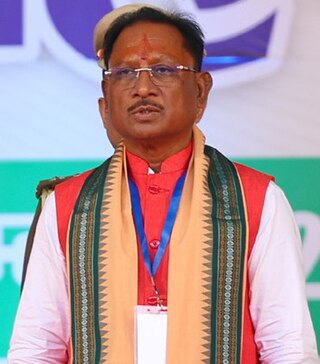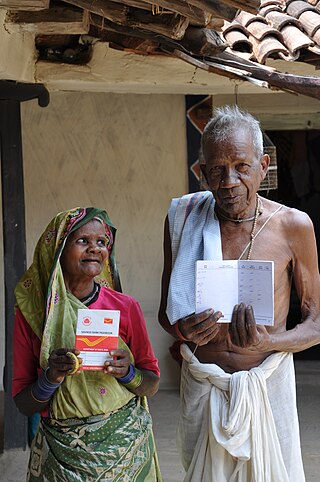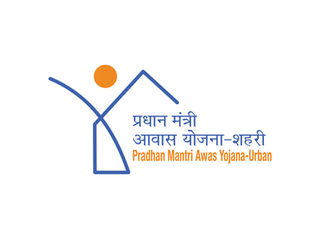
Cow dung, also known as cow pats, cow pies, cow poop or cow manure, is the waste product (faeces) of bovine animal species. These species include domestic cattle ("cows"), bison ("buffalo"), yak, and water buffalo. Cow dung is the undigested residue of plant matter which has passed through the animal's gut. The resultant faecal matter is rich in minerals. Color ranges from greenish to blackish, often darkening soon after exposure to air.

Vishnu Deo Sai is an Indian politician currently serving as the 4th Chief Minister of Chhattisgarh. He is the first senior tribal leader in Central India. Sai is a member of the Bharatiya Janata Party (BJP) and the Rashtriya Swayamsevak Sangh (RSS). He currently represents Kunkuri in Chhattisgarh Legislative Assembly.

The Pradhan Mantri Gram Sadak Yojana (PMGSY) is a nationwide plan in India to provide good all-weather road connectivity to unconnected villages. Of 178,000 habitations with a population of above 500 in the plains and above 250 in the hilly areas planned to be connected by all-weather roads, 82% were already connected by December 2017 and work-in-progress on the remaining 47,000 habitations was on-track for completion by March 2019.

Bhupesh Baghel, popularly known as Kaka, is an Indian politician who served as the 3rd Chief Minister of Chhattisgarh from 2018 to 2023. He was president of Chhattisgarh Pradesh Congress from 2014 to 2019. He represented the Patan constituency in the Chhattisgarh Legislative Assembly since 2013 and from 2003 to 2008. He had been cabinet minister of Transportation in undivided Madhya Pradesh in Digvijaya Singh government from 1999 to 2003. He was first Minister for Revenue, Public Health Engineering and Relief Work of Chhattisgarh.

Kapsi is a large marketplace village in the Kanker district of Chhattisgarh, India. It holds significance as a model village under two ambitious schemes of the Government of India, namely the Sansad Adarsh Gram Yojana and the Shyama Prasad Mukherjee National Rurban Mission. It is also the headquarters of the Kapsi forest range, the East Kapsi forest subdivision and the Kapsi water resource subdivision. Owing to its sizeable tribal population, it is defined as a Scheduled Area under the Fifth Schedule of the Constitution of India.

Pradhan Mantri Gramin Aawas Yojana is a social welfare programme under the Ministry of Rural Development, Government of India, to provide housing for the rural poor in India. A similar scheme for urban poor was launched in 2015 as Housing for All by 2022. Indira Awas Yojana was launched in 1985 by Rajiv Gandhi, the Prime Minister of India, as one of the major flagship programs of the Ministry of Rural Development to construct houses for the Below Poverty Line population in the villages.

The National Social Assistance Programme (NSAP) is a Centrally Sponsored Scheme of the Government of India that provides financial assistance to the elderly, widows and persons with disabilities in the form of social pensions. The NSAP scheme only includes Below Poverty Line individuals as beneficiaries.
Direct Benefit Transfer or DBT is an attempt to change the mechanism of transferring subsidies launched by Government of India on 1 January 2013. This scheme or program aims to establish a Giro system to transfer subsidies directly to the people through their linked bank accounts. It is hoped that crediting subsidies into bank accounts will reduce leakages, duplicity and delay and the new processes will increase transparency and accountability.

Atal Pension Yojana, formerly known as Swavalamban Yojana is a government-backed pension scheme in India, primarily targeted at the unorganised sector. It was mentioned in the year 2015 Budget speech by the Finance Minister Arun Jaitley. It was launched by Prime Minister Narendra Modi on 9 May 2015 in Kolkata. Its main objective is to help towards economic security of those people who become depressed after their working age and take retirement from professional life.

Pradhan Mantri Awas Yojana (PMAY) is a credit-linked subsidy scheme by the Government of India to facilitate access to affordable housing for the low and moderate-income residents of the country. It envisaged a target of building 2 crore (20 million) affordable houses by 31 March 2022. It has two components: Pradhan Mantri Awas Yojana(Urban) (PMAY-U) for the urban poor and Pradhan Mantri Awaas Yojana (Gramin) (PMAY-G and also PMAY-R) for the rural poor, the former administered by Ministry of Housing and Urban Affairs and the latter by Ministry of Rural Development. This scheme converges with other schemes to ensure that houses have a toilet, Saubhagya Scheme for universal electricity connection, Ujjwala Yojana LPG connection, access to drinking water and Jan Dhan banking facilities, etc.

Pradhan Mantri Ujjwala Yojana was launched by Prime Minister of India Narendra Modi on 1 May 2016 to distribute 50 million LPG connections to women of Below Poverty Line (BPL) families. A budgetary allocation of ₹80 billion (US$960 million) was made for the scheme. The scheme was replaced by the Ujjwala Yojana 2.0 in 2021. Although the scheme has expanded access to clean cooking technologies, the use of polluting fuels remains common, particularly in rural India.

Ayushman Bharat Pradhan Mantri Jan Arogya Yojana, also colloquially known as Modicare, is a national public health insurance scheme of the Government of India that aims to provide free access to health insurance coverage for low income earners in the country. Roughly, the bottom 50% of the country qualifies for this scheme. People using the program access their own primary care services from a family doctor and when anyone needs additional care, PM-JAY provides free secondary health care for those needing specialist treatment and tertiary health care for those requiring hospitalization.

The Third Ashok Gehlot ministry is the state cabinet of the Indian state of Rajasthan in the 15th Rajasthan Legislative Assembly headed by Chief Minister Ashok Gehlot.

Legislative Assembly elections were held in Chhattisgarh in two phases on 7 November and 17 November 2023 to elect all 90 members of Chhattisgarh Legislative Assembly. The votes were counted and the results declared on 3 December 2023.

Legislative Assembly elections were held in Madhya Pradesh on 17 November 2023 to elect all 230 members of Madhya Pradesh Legislative Assembly. The results were declared on 3 December 2023.

In the state budget presented by the Chhattisgarh government in India, a provision of Rs 5700 crore was made for the welfare of farmers through which Rajiv Gandhi Kisan Nyay Yojana was launched on 21 May 2020, the martyrdom day of former Prime Minister Rajiv Gandhi.
Nitin Dubey is an Indian singer, composer, actor, and lyricist. Born in Raigarh, Chhattisgarh. Dubey is known for his work as a composer, vocalist, music director, and playback singer in Chhattisgarh cinema and as a performer at various national level music festivals and bhajan programs.
TheAtal Beemit Vyakti Kalyan Yojana (ABVKY) is a government welfare scheme initiated by the Central Government of India. Originally introduced as a pilot project for a duration of two years, the primary objective of the scheme is to provide financial support to individuals facing unemployment during the COVID-19 pandemic. The scheme's duration was later extended until June 30, 2022.















